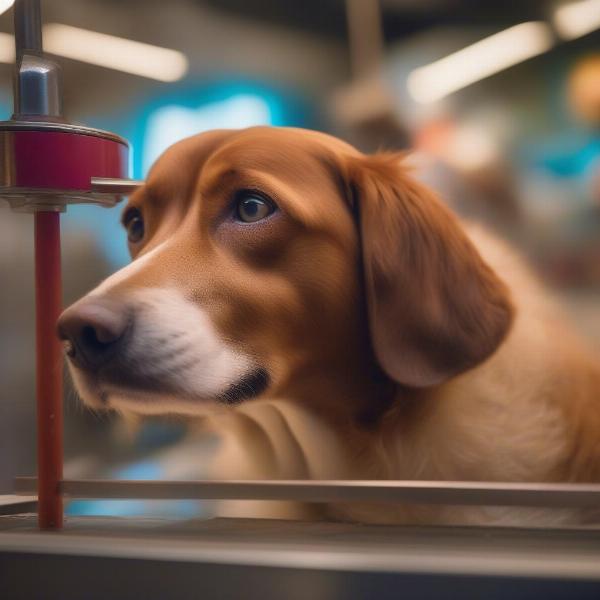Doner meat, that tempting, thinly sliced, rotating cone of seasoned meat, is a popular street food enjoyed around the world. But what about our furry friends? Can dogs eat doner meat? The short answer is: it’s best avoided. While a small, plain piece might not be immediately toxic, doner meat is typically high in fat, salt, and spices, all of which can cause digestive upset or more serious health problems for dogs. Let’s delve into the reasons why doner meat isn’t a good choice for your canine companion and explore some healthier alternatives.
Why Doner Meat is a No-Go for Dogs
While the aroma of doner kebab might tempt your pup, the ingredients and preparation methods make it unsuitable for their sensitive digestive systems. The high fat content can lead to pancreatitis, a painful and potentially life-threatening inflammation of the pancreas. Excess salt can cause dehydration, vomiting, and even sodium ion poisoning. The spices used in doner meat, such as onion and garlic powder, paprika, and cumin, can also be problematic for dogs, causing gastrointestinal irritation or contributing to anemia in certain breeds. Furthermore, the meat itself is often processed and may contain additives that are not beneficial for dogs. Finally, the way doner meat is cooked, often at high temperatures and with added fats, can create carcinogenic compounds that are harmful to both humans and animals.
 Dog looking longingly at a doner kebab
Dog looking longingly at a doner kebab
Healthier Alternatives to Doner Meat for Your Dog
Instead of sharing your doner kebab, offer your dog healthier, dog-specific treats or plain, cooked meats. Lean proteins like chicken, turkey, or beef, cooked without seasoning or added fats, are a much better option. You can also find a wide variety of commercially available dog treats made with wholesome ingredients. Remember to always introduce new foods gradually to avoid upsetting your dog’s stomach.
What to Do if Your Dog Eats Doner Meat
If your dog manages to snag a bite of your doner kebab, don’t panic. Monitor them closely for any signs of digestive upset, such as vomiting, diarrhea, or lethargy. If your dog exhibits any of these symptoms, or if they consumed a large amount of doner meat, contact your veterinarian immediately. They can advise you on the best course of action and provide necessary treatment if needed.
Can dogs eat small amounts of doner meat?
While a tiny sliver might not cause immediate harm, it’s still best to avoid giving your dog any doner meat. The risks outweigh the potential benefits, and there are plenty of other tasty and healthy treats you can offer your furry friend.
Is the fat in doner meat bad for dogs?
Yes, the high fat content in doner meat is particularly problematic for dogs. It can lead to pancreatitis, a serious and potentially life-threatening condition.
Are the spices in doner meat harmful to dogs?
Many of the spices commonly used in doner meat, such as onion and garlic powder, can be harmful to dogs, causing gastrointestinal irritation or even anemia.
Conclusion
While it might be tempting to share your doner kebab with your furry friend, it’s important to remember that doner meat isn’t a suitable food for dogs. The high fat content, salt, and spices can cause a range of health problems, from mild digestive upset to serious conditions like pancreatitis. Opt for healthier alternatives like plain, cooked meats or dog-specific treats to keep your canine companion happy and healthy.
FAQ
- What should I do if my dog ate a large amount of doner meat? Contact your veterinarian immediately.
- Can I give my dog doner meat if I remove the spices? No, the high fat content still poses a risk.
- What are some healthy treat alternatives to doner meat? Plain cooked chicken, turkey, beef, or commercially available dog treats.
- Are all spices bad for dogs? No, but many common spices used in doner meat are harmful.
- Can doner meat cause long-term health problems in dogs? Yes, repeated consumption can contribute to conditions like pancreatitis and obesity.
- Why is onion and garlic powder bad for dogs? They can damage red blood cells and lead to anemia.
- What are the signs of pancreatitis in dogs? Vomiting, diarrhea, lethargy, loss of appetite, and abdominal pain.
ILM Dog is your trusted source for expert advice on dog care and well-being. We offer comprehensive resources on everything from breed selection and nutrition to training and health care. Our team of experienced professionals is dedicated to helping you provide the best possible care for your canine companion. Need more personalized advice? Contact us at [email protected] or call us at +44 20-3965-8624. Visit ILM Dog for more information.